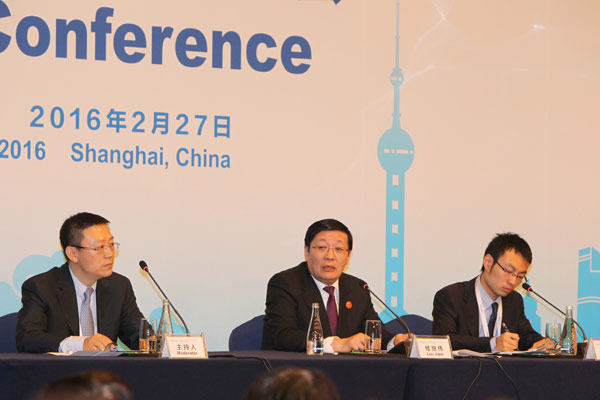The G20 ministers meet in Shanghai: the elusive secret of growth
- By Tim Collard
 0 Comment(s)
0 Comment(s) Print
Print E-mail China.org.cn, February 29, 2016
E-mail China.org.cn, February 29, 2016
|
|
|
Lou Jiwei (Center), the finance minister of China, addresses a press conference at the G20 Finance Ministers and Central Bank Governors Meeting held in Shanghai on Saturday. [Photo by Gao Erqiang/China Daily] |
The gloomy prospect of the world's economy was the principal item on the agenda at the G20 Finance Ministers' meeting in Shanghai last week. Every country in the world appears to be in search of that elusive secret of growth. It is therefore not inappropriate that the ministers should gather in the country which seems to have come nearest to discovering the magic formula, namely, China. Chinese growth has come under downward pressure in the last few years, but the headline figures are still enviable from the rest of the world's point of view. So, is it realistic to expect leadership from China in the pursuit of global growth?
Differences have come to light between China's approaches compared to those of some Western countries, not due to a real difference of aims or objectives, but due to the fact that the economic and business cycles between China and the West are not quite synchronised. It has taken some time for China to move towards integration with the global financial system, and this is very understandable. China's financial defence mechanisms helped to ensure that she was not too severely affected by the global turmoil of 1998 and 2008. It is therefore natural that China should manoeuvre very carefully in the direction of alignment with the other major economic players, and thus there are still differences of circumstances which carry weight against cooperation with countries whose immediate situation and requirements may be very different.
For instance, it soon became clear that any agreement regarding a coordinated stimulus package was not going to transpire. Despite a recommendation included in a report issued by the IMF on February 24, suggesting that the G20 should now start preparing for such a stimulus programme, German Finance Minister Wolfgang Schaeuble declared that his country firmly opposed such a step, "We, therefore, do not agree on a G20 fiscal stimulus package as some argue, in case unintended future consequences materialize".
China's line on the more difficult economic times we are living in is centred on the country's current domestic priority of structural reform as the best guarantee of sustained economic growth, which could and should be adapted by all G20 countries, Finance Minister Lou Jiwei told the Ministers and central bank governors in attendance. This would involve proactive government efforts in removing trade barriers and more investment encouragement. China is raising the ratio of the fiscal deficit to GDP and aims to reduce the tax burden on small and innovative enterprises. Employment legislation needs to be improved to liberalise the labour market.






